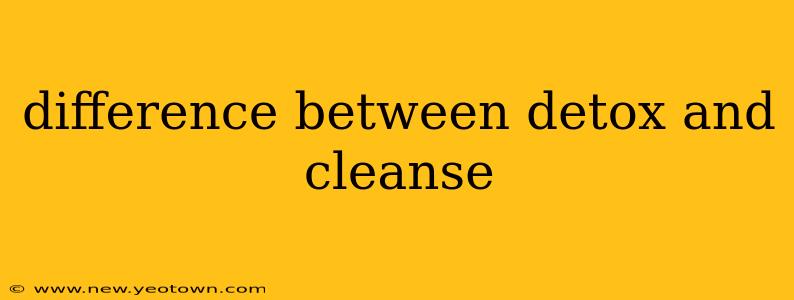The Great Detox vs. Cleanse Debate: Unraveling the Myths
For years, the terms "detox" and "cleanse" have been tossed around, often interchangeably, promising miraculous health transformations. But are they really the same thing? The answer, like many things in the health and wellness world, is nuanced. Let's dive into the differences between these popular, yet often misunderstood, concepts.
My journey into understanding this distinction began with a friend’s fervent belief in the power of a "7-day juice cleanse." She claimed it rid her body of "toxins," leaving her feeling lighter and energized. Intrigued, but skeptical, I began researching, and what I discovered surprised me. There's a lot more to this than meets the eye.
What is a Detox?
The term "detox," short for detoxification, refers to the body's natural process of eliminating waste products and harmful substances. Our liver and kidneys are the workhorses of this process, filtering toxins from our blood and excreting them through urine, sweat, and bowel movements. A true detox is not a fad diet or a juice cleanse; it’s an ongoing, internal operation.
Think of your body as a sophisticated machine. It's constantly working to maintain balance and eliminate harmful substances. While this process is remarkable, it can be overwhelmed by excessive exposure to environmental pollutants, processed foods, alcohol, and drugs. Supporting your body's natural detoxification pathways is key, not attempting to override them with drastic measures.
What is a Cleanse?
A cleanse, on the other hand, is a much broader term encompassing various practices intended to improve health and well-being. This can include dietary changes, such as eliminating certain foods or focusing on specific nutrients; supplements; herbal remedies; and sometimes even colonics. Cleanses often aim to "cleanse" the body of accumulated toxins, but the scientific evidence supporting these claims is often weak or nonexistent.
The variety of cleanses is vast. Some are short-term, like a 3-day juice cleanse, while others might span weeks or even months. Many involve restrictive diets, and some might be quite intense.
What's the Difference? The Core Distinction
The fundamental difference boils down to this: detoxification is a natural bodily process; a cleanse is a self-imposed intervention designed to support or supposedly enhance that process. While some cleanses might provide temporary benefits like improved bowel regularity due to increased fiber intake, they are not necessary for healthy detoxification. The body is remarkably efficient at eliminating toxins on its own.
Over-reliance on cleanses can even be detrimental. Restrictive diets can lead to nutrient deficiencies, and some cleanses may have adverse effects on individuals with certain health conditions.
Are Detox Teas and Supplements Effective?
This is a common question, and the answer is usually no. While some herbal teas might have mild diuretic or laxative effects, they don't magically remove toxins. Similarly, many detox supplements lack scientific evidence to support their claims. It's always best to consult a healthcare professional before starting any new supplement regimen.
Do I Need a Detox or Cleanse?
The short answer is likely no. Unless you have a specific medical condition requiring detoxification procedures under medical supervision, your body already has the tools it needs to handle toxins. Focusing on a balanced, whole-foods diet, regular exercise, adequate hydration, and stress management is far more effective than any fad cleanse or detox.
How Can I Support My Body's Natural Detoxification Processes?
Instead of resorting to potentially harmful cleanses, you can support your body's natural detox mechanisms through:
- Hydration: Drink plenty of water to help flush out waste products.
- Fiber-rich diet: Include plenty of fruits, vegetables, and whole grains to promote regular bowel movements.
- Regular Exercise: Physical activity supports overall health and helps the body eliminate toxins.
- Stress Management: Chronic stress can negatively impact detoxification pathways. Practice relaxation techniques like yoga or meditation.
- Limit Exposure to Toxins: Minimize your exposure to environmental pollutants, processed foods, and alcohol.
By focusing on these natural and sustainable practices, you can support your body's incredible ability to detoxify itself effectively and maintain optimal health. Remember, true well-being isn't found in fleeting trends but in lasting, healthy habits.

